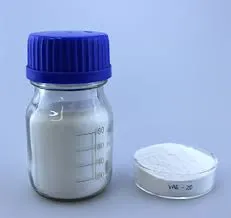
Lis . 30, 2024 07:21 Back to list
Application of Hydroxyethyl Cellulose in Various Industries and Its Benefits
The Use of Hydroxyethyl Cellulose Versatility and Applications
Hydroxyethyl cellulose (HEC) is a non-ionic, water-soluble polymer derived from cellulose, a natural polymer found in the cell walls of plants. HEC is widely used across various industries due to its unique properties, including thickening, gelling, and film-forming capabilities. This article explores the diverse applications of hydroxyethyl cellulose, highlighting its significance in various fields.
1. Pharmaceutical Applications
In the pharmaceutical industry, hydroxyethyl cellulose is primarily utilized as a thickening agent, emulsifier, and stabilizer in formulations. Its ability to form gels makes it essential in the production of topical preparations, such as creams and ointments. HEC helps maintain a uniform consistency, ensuring that active ingredients are evenly distributed. Additionally, it's employed in drug delivery systems, where it can control the release of drugs over time, improving therapeutic efficacy. HEC is also used to manufacture films for sustained release formulations and oral tablets, enhancing their stability and bioavailability.
2. Cosmetics and Personal Care Products
The cosmetic industry relies heavily on hydroxyethyl cellulose for its thickening and emulsifying properties. HEC is commonly found in lotions, shampoos, conditioners, and gels, where it helps achieve the desired viscosity and texture. Its film-forming abilities contribute to the product’s ability to create a smooth, even application on the skin or hair. Furthermore, HEC is valued for its biocompatibility and mildness, making it an ideal choice for sensitive skin formulations. It also serves as a stabilizer in various emulsions, preventing separation and enhancing the longevity and performance of cosmetic products.
3. Food Industry
use of hydroxyethyl cellulose

In the food sector, hydroxyethyl cellulose acts as a food additive, recognized for its thickening, stabilizing, and gelling properties. It is often used in low-fat and gluten-free products to improve texture and mouthfeel. HEC is also employed in sauces, dressings, and dairy products to achieve the desired thickness while maintaining a desirable sensory profile. Its ability to retain moisture makes it beneficial in baked goods, helping to extend shelf life and enhance quality. Moreover, as a non-toxic and non-allergenic substance, HEC is favored in foods targeting health-conscious consumers.
4. Construction and Adhesives
The construction industry benefits from hydroxyethyl cellulose’s properties as a thickening agent in mortars, adhesives, and paints. HEC improves workability and application properties, allowing for better control during the application process. In tile adhesives, for example, HEC helps retain moisture, ensuring optimal adhesion and setting times. Additionally, its water-retention capabilities contribute to preventing cracking and shrinkage in cementitious mixtures. In paints and coatings, HEC provides a smooth finish while enhancing the stability and flow of the product.
5. Agricultural Applications
Hydroxyethyl cellulose finds uses in agriculture, primarily as a soil conditioner and in the formulation of agrochemicals. Its thickening properties can improve the efficiency of herbicides, pesticides, and fertilizers by ensuring that active ingredients adhere to plant surfaces better, thereby enhancing their effectiveness. Furthermore, as a soil conditioner, HEC helps improve soil structure, water retention, and nutrient availability, leading to healthier crop growth.
Conclusion
The versatility of hydroxyethyl cellulose highlights its significance in multiple industries, from pharmaceuticals to food and cosmetics. Its unique properties make it an essential ingredient in enhancing product performance, stability, and user experience. As industries continue to evolve, the demand for hydroxyethyl cellulose is expected to grow, with further innovations likely emerging to harness its capabilities more efficiently and sustainably.
-
Versatile Hpmc Uses in Different Industries
NewsJun.19,2025
-
Redispersible Powder's Role in Enhancing Durability of Construction Products
NewsJun.19,2025
-
Hydroxyethyl Cellulose Applications Driving Green Industrial Processes
NewsJun.19,2025
-
Exploring Different Redispersible Polymer Powder
NewsJun.19,2025
-
Choosing the Right Mortar Bonding Agent
NewsJun.19,2025
-
Applications and Significance of China Hpmc in Modern Industries
NewsJun.19,2025







